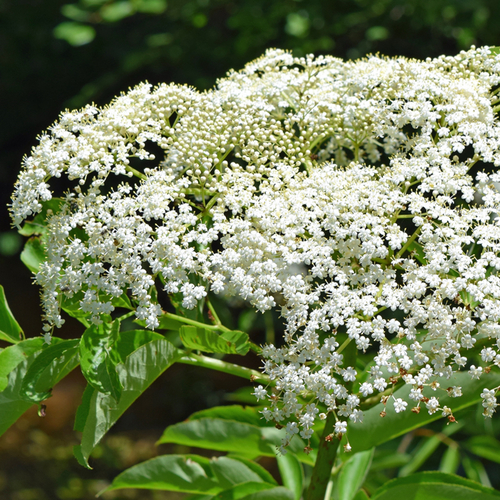Monographs licensed from Therapeutic Research Center, LLC
Scientific names: Sambucus canadensis
Family: Adoxaceae/Sambucaceae
Alternate names: American Elderberry, Common Elderberry, Elder Flower, Elderberry, Sabugueiro, Saúco, Saúco de Canada, Sureau, Sureau Blanc, Sureau du Canada, Sweet Elder
Scientific names: Sambucus canadensis
Family: Adoxaceae/Sambucaceae
Alternate names: American Elderberry, Common Elderberry, Elder Flower, Elderberry, Sabugueiro, Saúco, Saúco de Canada, Sureau, Sureau Blanc, Sureau du Canada, Sweet Elder
American elder is a plant. The flower and ripe fruit are used to make medicine.
People use American elder for breathing problems such as asthma and bronchitis; for colds, cough, and sore throat; and for painful conditions such as headache, nerve pain (neuralgia), joint pain (rheumatism), toothache, and swelling (inflammation).
Other uses include treatment of bruises, cancer, intestinal gas, epilepsy, fever, gout, psoriasis, sores, syphilis, and fluid retention (edema) due to weak heart function (heart failure).
Some people use American elder as a “purifier” that empties the bowels. It is also used to rid the body of extra fluid by increasing urine production (as a diuretic), “sweat out a fever,” promote healing, and cause vomiting.
American elder is also used as an eyewash, mouthwash, and poultice.
In foods, American elder is cooked and eaten and used to make elderberry wine. American elder is also used to flavor foods and beverages.
In manufacturing, extracts of American elder are used in perfumes.
American elder flowers or cooked, ripe fruit are safe for most adults in the amounts found in foods. There is some scientific evidence that suggests the flowers are safe in medicinal amounts, which are typically larger. Some side effects might include nausea, vomiting, weakness, dizziness, numbness, and stupor.
The leaves, stems, or unripe fruit are UNSAFE. If eaten, they can cause cyanide poisoning. Juice made from unripe fruit can also be poisonous.
Special Precautions & Warnings:
Pregnancy and breast-feeding: It is UNSAFE to use the leaves, stems, or unripe fruit of American elder because they contain chemicals that can cause cyanide poisoning. There isn’t enough information to know whether it is safe to use the flower or cooked, ripe fruit if you are pregnant or breast-feeding. Stay on the safe side, and avoid using any form of American elder.
Children: Some children like to make peashooters from American elder stems, but this practice isn’t as harmless as it sounds. The stem contains chemicals that can cause cyanide poisoning. Some “peashooter poisonings” have been reported.
NatMed Pro rates effectiveness based on scientific evidence according to the following scale: Effective, Likely Effective, Possibly Effective, Possibly Ineffective, Likely Ineffective, Ineffective, and Insufficient Evidence to Rate.
- Asthma.
- Bronchitis.
- Bruises.
- Cancer.
- Intestinal gas.
- Constipation.
- Colds.
- Water retention (edema).
- Epilepsy.
- Fever.
- Gout.
- Headache.
- Nerve problems.
- Other conditions.
More evidence is needed to rate the effectiveness of American elder for these uses.
The appropriate dose of American elder depends on several factors such as the user's age, health, and several other conditions. At this time there is not enough scientific information to determine an appropriate range of doses for American elder. Keep in mind that natural products are not always necessarily safe and dosages can be important. Be sure to follow relevant directions on product labels and consult your pharmacist or physician or other healthcare professional before using.
Interactions with pharmaceuticals
Lithium
Interaction Rating=Moderate Be cautious with this combination.
American elder might have an effect like a water pill or "diuretic." Taking American elder might decrease how well the body gets rid of lithium. This could increase how much lithium is in the body and result in serious side effects. Talk with your healthcare provider before using this product if you are taking lithium. Your lithium dose might need to be changed.
Medications changed by the liver (Cytochrome P450 3A4 [CYP3A4] substrates)
Interaction Rating=Moderate Be cautious with this combination.
Some medications are changed and broken down by the liver. American elder might decrease how quickly the liver breaks down some medications. Taking American elder along with some medications that are broken down by the liver can increase the effects and side effects of some medications. Before taking American elder, talk to your healthcare provider if you are taking any medications that are changed by the liver.
Some medications changed by the liver include lovastatin (Mevacor), ketoconazole (Nizoral), itraconazole (Sporanox), fexofenadine (Allegra), triazolam (Halcion), and many others.
Interactions with herbs & supplements
There are no known interactions with herbs and supplements.
There are no known interactions with foods.
Research suggests that some of the chemicals in American elder leaf might work as a laxative, diuretic, and germ-killer. American elder also contains lots of vitamin C.
vital.ly has licensed monographs from TRC Healthcare.
This monograph was last reviewed on 29/12/2022 18:10:35. Monographs are reviewed and/or updated multiple times per month and at least once per year.
Natural Medicines disclaims any responsibility related to medical consequences of using any medical product. Effort is made to ensure that the information contained in this monograph is accurate at the time it was published. Consumers and medical professionals who consult this monograph are cautioned that any medical or product related decision is the sole responsibility of the consumer and/or the health care professional. A legal License Agreement sets limitations on downloading, storing, or printing content from this Database. No reproduction of this monograph or any content from this Database is permitted without written permission from the publisher. It is unlawful to download, store, or distribute content from this site.
Natural Medicines rates safety based on scientific evidence according to the following scale: Likely Safe, Possibly Safe, Possibly Unsafe, Likely Unsafe, Unsafe, and Insufficient Evidence to Rate. For more information about Natural Medicines’ Safety Rating System,
click here.
The Natural Medicines Effectiveness Ratings are assigned for specific indications. A product might be rated "Possibly Effective" for one condition, but be rated "Likely Ineffective" for another condition, depending on the evidence. For more info
click here.





